Director Sanjay Puran Singh Chauhan’s 72 Hoorain or Bahattar Hoorain was recently released for commercial viewing across theatres in India. Strangely, the project reached its completion stage as early as 2019. It premiered at the 50th International Film Festival of Indin in the same year of its completion and also won a national award in 2021. After four years of it rotting in the can, what could be the reason for 72 Hoorain‘s theatrical release now?
To answer this, one must consider the recent turbulence created by the release of Sudipto Sen’s blatant anti-Islamist propaganda film The Kerala Story. Only a year ago, The Kashmir Files had elicited a similar audience response with many calling it openly Islamophobic and inflammatory, while Bhakts and Sanghis revelled in the violent messaging of the film.
The political climate today is a serious situation where Indian Muslims are increasingly becoming easy targets for violence at the hands of Hindutva-supporting fanatics whose twisted so-called ‘revenge,’ plot is only fanned by the release of such films. After already hurt sentiments, the controversial title and trailer of 72 Hoorain have put netizens further on guard for more propaganda and attempts at brainwashing. In response to the trailer, many have called the film a part of the tightening circulation of anti-Islamic propaganda.
Hindutva supporters have applauded the film for ‘exposing,’ the so-called ‘truth,’ of the nation. Critics and filmmakers have called it Bollywood’s arthouse attempt. But what does the film say itself?
After already hurt sentiments, the controversial title and trailer of 72 Hoorain have put netizens further on guard for more propaganda and attempts at brainwashing. In response to the trailer, many have called the film a part of the tightening circulation of anti-Islamic propaganda.
Of all the conversation and buzz generated around the film, 72 Hoorain has struggled to do well at the box office. Despite the attempt by the filmmakers to cash in the tumultuous atmosphere after The Kerala Story, few have felt the need to purchase tickets to the film.
The controversy has sparked far and wide so much so that the actual message of 72 Hoorain remains silent and ignored. But is 72 Hoorain in itself Islamophobic or have the filmmakers conveniently distorted their original message to better fit the current political climate and make easy money?
Islamophobia or irony?
After losing their lives in a pre-planned terrorist attack at Mumbai’s Gateway of India, two suicide bombers find themselves shuttling between earthly and spectral realms, instead of the promised bahattar angels greeting them at Heaven’s gate. The two begin to question their beliefs as they are forced to confront the aftermath of the terror attacks.
It is easy to interpret this as merely a part of the anti-Islamic spew of nonsense that has littered the screens so far, but the film in and of itself takes care to establish the fact that it does not equate terrorism with Islam.
The message of 72 Hoorain attempts to make the audience realise that jihadist terrorist organisations are not representative of Muslims worldwide. It is only a few extremist leaders who twist the words of the Quran at their convenience in order to suit their violent methods.
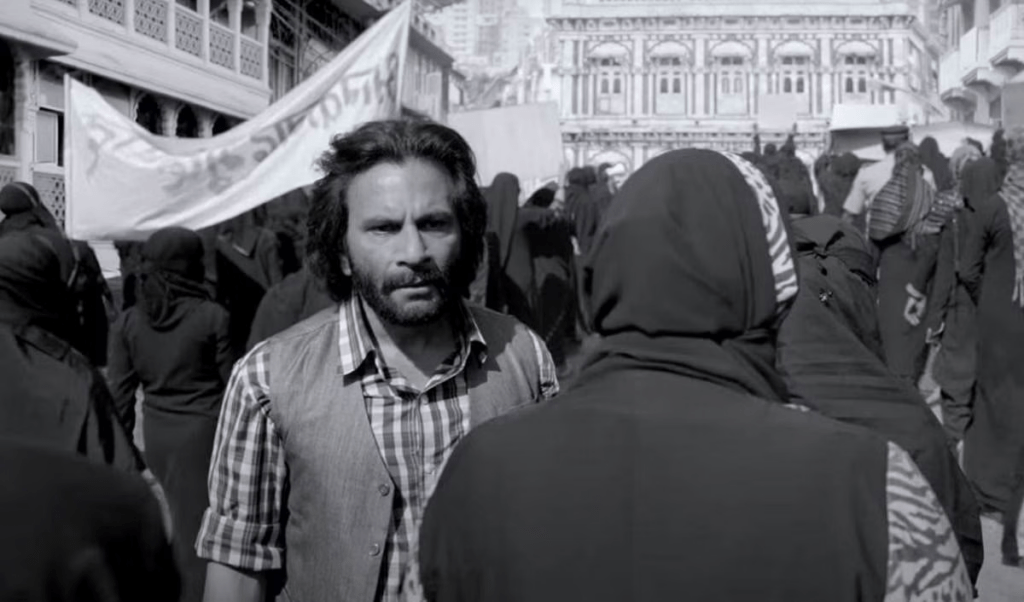
72 Hoorain begins with the leader of a terrorist organisation delivering a speech on the special benefits a jihadi is liable to in Heaven. He claims that 72 virginal fairies lay in wait for those who are willing to give up their lives for a ‘larger‘ purpose. Soon after, the film cuts to a scene where Hakim and Bilal’s spirits encounter a procession of burkha-clad women protesting the corrupted and twisted interpretation of jihad as propounded by terror groups. The various placards they hold up read messages of peace, a call to stop terrorism in the name of jihad, and that Islam has nothing to do with the taking of innocent lives.
A satire with a saviour complex
It is thus automatically clear to the filmgoer that the film claims that the doctrines of Islam lay in the latter, and not the twisted speech filled with lies in the former scene. Hakim and Bilal are on the realising end too, as they slowly begin to discover that the violent narratives they were fed disguised as religious beliefs had nothing to do with the practices of Islam.
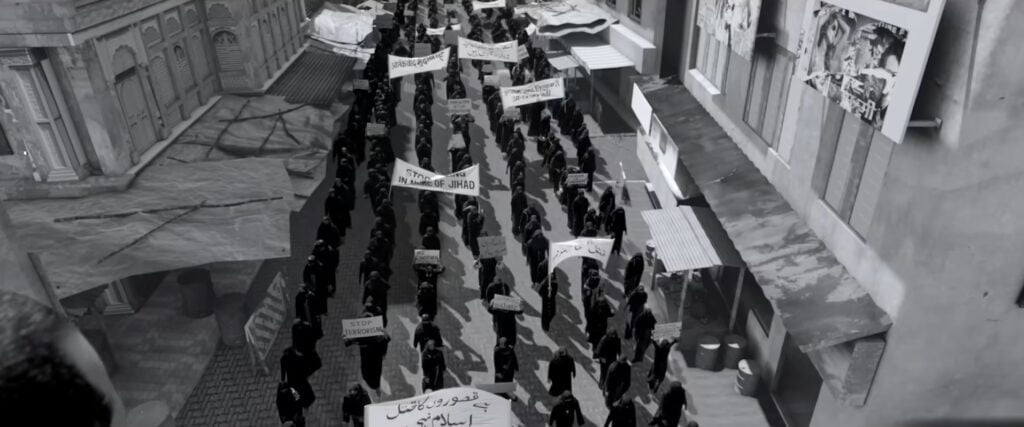
This makes the stance of the film clear. “Blame the individual, not the religion,” it says. 72 Hoorain is a satire that talks about the confused logic used by extremists who twist the teachings they claim to believe in, in order to secure their own personal ends. The film argues that certain terrorist groups twist the Holy Quran’s universal message of peace to manipulate innocent followers into committing heinous acts for political gain.
72 Hoorain shows how innocent believers stuck in the pitfalls of poverty are lured into fraudulent ideas of jihad by not only a promise of food and shelter for their families but an ultimate reward after death. To contrast the deceitful ‘Maulvi,’ in the film brings in another, more honest maulvi at the end. A serene and well-educated man, he is the very picture of an established theologian. He becomes of insurmountable help to the local bodies in locating the stolen bodies of the two deceased terrorists.
Occasionally, excerpts from the Quran flash on the screen, citing messages of peace, condemning even the loss of one innocent life. The subtext here reads as a declaration that terrorist activities in fact directly go against the tenets of Islam.
What remains tenuous, however, is the connection of the title to the actual film itself. Other than the initial few minutes of the film, very little of the actual plot has to do with the alleged concept of 72 Hoorain. The language of the film is surrealist, distinctive from its so-called counterparts that ultimately claim hyperrealism as their source of inspiration. It is shot entirely in black and white, with the occasional splotches of colour.
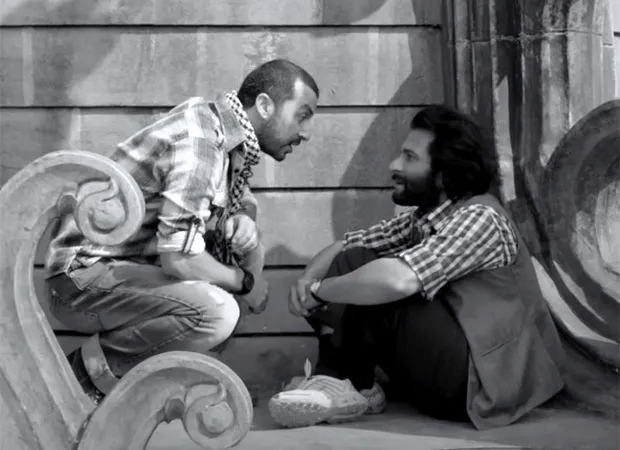
The colour grading is a direct reference to the 1993 epic Schindler’s List by filmmaker Steven Spielberg. Perhaps this is to find previous precedents of films that have explored themes of indoctrination and proclaimed a message of peace against genocidal activities.
However, the execution felt a tad bit more stylistic than needed, which happens ever so often when a film is all too familiar with its so-called poetic tendencies. Although slow, the film deals with heavy themes even though the plot of the film itself is underwritten and hastily fleshed out. 72 Hoorain specifically begins to lose its plot exactly when it tries to introduce a definitive plot into the film. Before the second half, the slow rhythm of the film strides into a self-referential “arthouse,” project bearing a message of peace. Suddenly, this shifts gear in the second half as a bizarre plot is introduced that seems to exist just for the sake of it.
Plot without plot
The government has secretly disposed of Hakim and Bilal’s mutilated bodies in an uninhabited wasteland. This is later discovered by the saffron brigade, who comes armed with their own terrorists to dig out the bodies and toss them into the sea. A direct parody of the Rath Yatra procession, the filmmakers take a quiet dig at Hindutva politics that deal with purity/pollution narratives. ‘These terrorists will pollute the holy land of our country,‘ says one party worker.
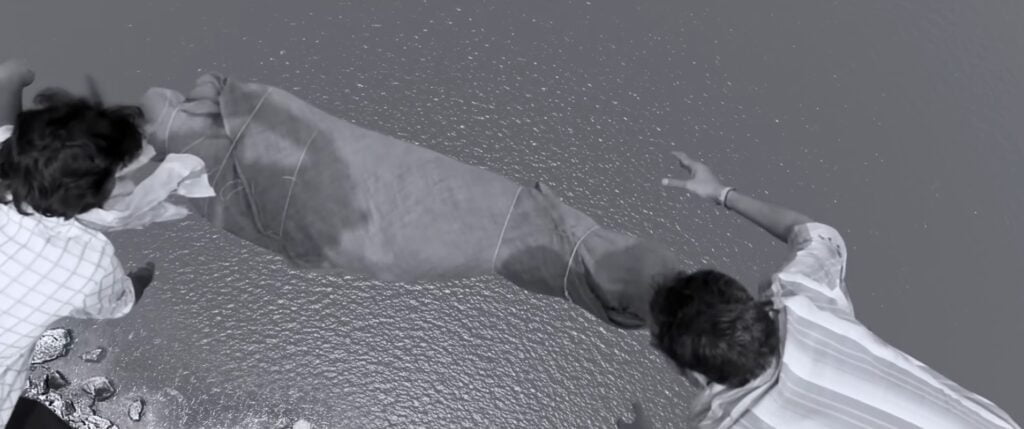
The men dig at the ground only to find that the bodies have been ‘stolen,’ by a confused pair of organ traffickers. Once it is revealed to them exactly whose bodies these are, they decide to hand them over to a local Maulvi stupidly assuming that he must be in direct contact with ISIS. Of course, the Maulvi then phones the local authorities to report the theft, who then promise to bury the bodies in proper Islamic ritual, an honour the Maulvi believes every Muslim to be worthy of.
If this is done to push forward a message of redemption and forgiveness in the stead of God, then it fails to make as much of an impact as the first half of the film had. Even so, the resolution of the film ends with a jump a few years forward, as Hakim and Bilal end up right where they started: now inside the Victoria Terminus rather than outside.
This leaves the audience rather confused about the significance of the bodies moving from location to location as an important, even central plot point. Disregarding this line of thought, the film appropriately explores the before, during, and after of the terror attacks, cutting back and forth to introduce context. This break of chronological teleology offers the audience a cause-and-effect relationship in a manner that best seeks to serve the ultimate message of the film: that terrorism has no religion.
Relevance of 72 Hoorain today?
The fact that 72 Hoorain is being interpreted as Islamophic by liberals and Sanghis alike, however, is concerning. Although the timing of the film is ill, for it comes in direct shadow of a hateful, anti-minority, propaganda film, this speaks volumes about internet discourse in general. The title of the film, satirical at best, has been grossly misinterpreted to represent the opposite of what it attempts to say.
The political climate of India today has shifted the overton window so far right that liberals and Bhakts alike tend to judge first and think later. This is dangerous to do, especially with a film that seeks to highlight the dangers of indoctrination.
The fact that the 72 Hoorain is being interpreted as Islamophic by liberals and Sanghis alike, however, is concerning. Although the timing of the film is ill, for it comes in direct shadow of a hateful, anti-minority, propaganda film, this speaks volumes about internet discourse in general. The title of the film, satirical at best, has been grossly misinterpreted to represent the opposite of what it attempts to say.
With the rise of violent right-wing ideology in India, such commentary is indeed extremely important. After the tasteless propaganda message of The Kerala Story, 72 Hoorain is perhaps a stitch in time. It makes you wonder how indoctrination is functioning within the Sanghi circuits, cleverly disguised under the garbs of pop culture.
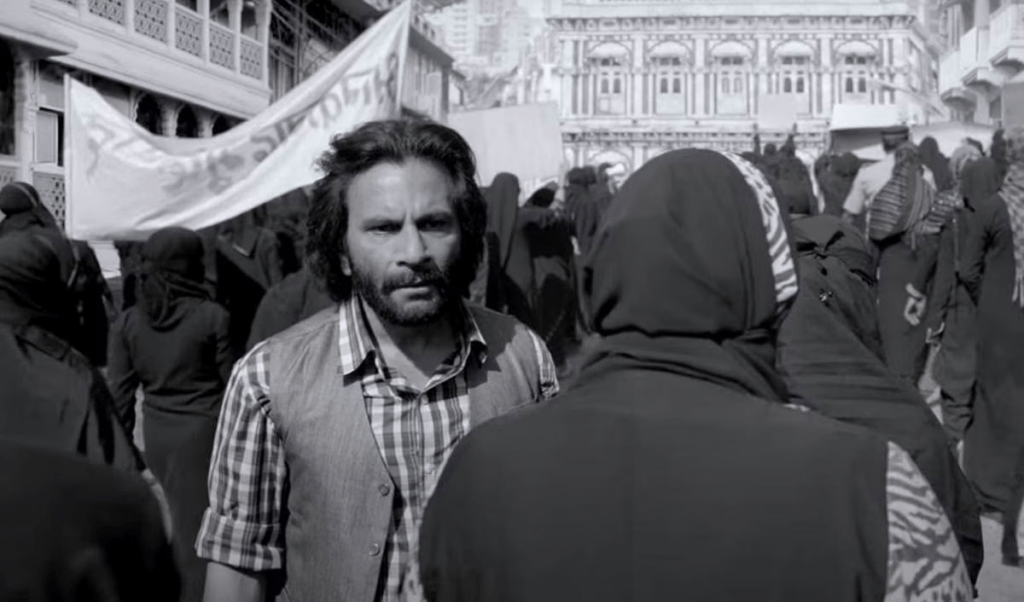
Despite its intentions, however, 72 Hoorain fails to flesh out the nuance it tries to point at, leading the film to be easily misinterpreted for what it does not say. What remains unfortunate, however, is how the filmmakers have tried to cash in this instance of miscommunication, thinking that the creation of the controversy will lead to large ticket sales. It is safe to say that this has not in fact been the case, and the lack of viewership has only furthered the allegations of anti-Islamic sentiments.
All in all, the 72 Hoorain itself becomes nothing special, for all its messaging and controversy, the product is only a copycat, an ‘indie‘ production that lacks the guts to say what it does proudly.
About the author(s)
Ananya is a writer and researcher of all things literature. With a particular emphasis on film, gender, and sexuality, she is great at curating the perfect movie night, but when it comes to life itself, she's still figuring out the script.
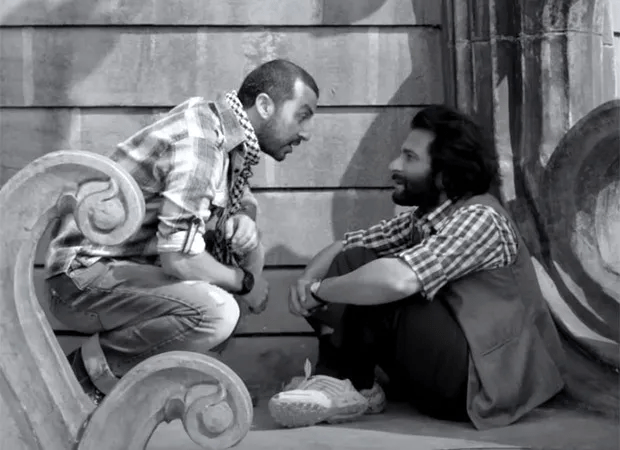





Islamophobia or Hindutva doesn’t matter…let’s all to spiritualism and become better versions of ourselves each day…where ever whichever religion we are born in ,was done for a higher purpose and no God or books teach violence or hate.
Really thought provoking article, very well written…..Ananya keep it up.
glad to see a nuanced perspective on this topic!
If you see with a lens of phobia you will see that… Open your mind embrace realism, sitting and commenting is easy feel for the people from partition, kashmir, our forefathers who were thrown from afghanistan, bangladesh and we don’t even have left over india…. where would you run now? enough of this self masquerading as pseudo…
First off, let’s get one thing straight – terrorism ain’t tied to any one religion, okay? Most folks who follow any faith are all about peace, love, and understanding. But there’s this small group of bad apples who twist religious teachings for their own agenda, and that’s what leads to terrorism.
In my humble opinion, Hindutva can totally be a game-changer against terrorism! By embracing and safeguarding Hindu culture and values, it helps forge strong national unity and tackle those extremist ideologies head-on. But hey, ppl have different takes on this, so let’s keep the convos open and respectful! 😄🙏
I must save everyone should stand when it comes to women’s empowerment in this world. we must not forget that we are humans on this planet and we should promote humanity. The concept of 72 hours is not meant for this world. And in no way we should fight against it, It is just a religious belief and we should lock horns and raise our voices against woman harassment in Manipur.
I think we should be more focused on present human values rather than insulting someone about their religious beliefs.